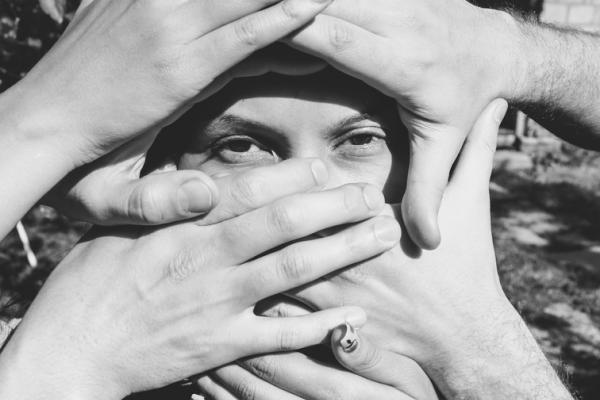We’ve all heard the sidewalk preachers and TV Evangelists quoting the Gospels, telling us, "Repent, for the Kingdom of God is at hand!"
It’s a claim that is generally intended to strike fear and trembling in the hearts of many. We’re supposed to straighten up, do right, and atone for all of our heinous, sinful ways.
If you went to my kind of church growing up, there wasn’t a sermon that went by that you didn’t hear the pastor say something like, "The end could be today, tomorrow or next week. So you’d better beg for forgiveness, get right with the Lord, or risk getting ‘left behind.’"
The season of Lent is a time of reflection and repentance, yes. But we’ve come to misunderstand both what it means to repent, and what Jesus is talking about when he foretells of God’s coming Kingdom.
As for the latter, Jesus preached to some degree about the afterlife, yes. But his Kingdom-talk primarily was focused on us, on receiving and co-creating God’s Kingdom vision for ALL of us, here and now, in our very midst. So rather than talking about some hellfire apocalyptic end-times, he’s urging us to open our eyes, to see what’s right in front of us.
We can have what he, what God, long for us. To live in a world inspired and living into the Kingdom possibilities just there, nearly within our reach if we’ll only claim it and risk everything to fulfill it.
It’s hard to be optimistic about changing the world when our news cycle is dominated by terrorism, violence, and disease. When world events shock us, sometimes our best hopes cave in to our worst fears. Even the most radical activist may be tempted to give up.
But there is a different narrative that summons those of us who dare to care. It begins when we confront the things that have kept millions from breaking free from poverty and injustice. It ends when we find the courage to change how we change the world.
In the Democratic Republic of Congo, which consistently ranks among the poorest countries in the world and the most dangerous for women, a group of peacemakers are changing the narrative. Last year I met a Congolese woman who told me how her husband was killed in crossfire between warring militias, how she was violently assaulted by the soldiers who were supposed to protect her, and how she fled her village with her eight children under the cover of night. In the wake of her suffering, she joined a group of women to save small amounts of their own money each week. From her savings, she launched a soap-making business. Over time, she employed others and taught her sisters how to do the same. She helps others to forgive their perpetrators and, together, they are determined to stop the violence against women in a land known as the rape capital of the world.
Today thousands of peacemakers like her are changing Congo, and their numbers continue to swell. They are “waging peace” to save Congo one village at a time.
Bugsplat is software used to calculate and reduce the death of innocent people in drone strikes. It's also how Predator drone operators talk about the people whom the American military kills in these missions. The Bureau of Investigative Journalism estimates that the U.S. is responsible for 2,500 deaths in Pakistan, Yemen, Somalia since 2001, including dozens of children. This figure doesn¹t even count Iraq and Afghanistan. But we don't know for sure how many innocents die because most Americans, including too many of our political and military leaders, do not even know when drone strikes happen, whom exactly they target and why, and whether they are successful in achieving their objectives.
Drone attacks require the president's review and approval. And it is the military's responsibility to execute plans so that no innocent lives are lost. But our democracy is a work in progress, and it will only function well if American citizens stay involved. Given President Obama's request last fall for Congress to approve strikes in Syria, we should call on elected officials to fully debate the 2001 Authorization for Use of Military Force — which has often served as a blanket legal justification for drone strikes, going far beyond its original purpose to take action against those responsible for the September 11 attacks. Repealing the act will help reinstate the checks and balances that are hallmarks of democracy. Our leaders must be more transparent.
The Christian journey of Lent is upon us. Lent commemorates Jesus’ journey into the wilderness. After his baptism, where Jesus heard the voice of God say to him, “This is my Son, the Beloved, with whom I am well pleased,” Jesus was led by the Spirit into the wilderness. After 40 days of fasting, he was tempted by the devil.
In good mimetic fashion, Jesus had received his true identity from God at his baptism. As radically relational creatures, mimetic theory claims that we receive our identity in relationship with others. If you were to ask me to identify myself, I would respond by referring to my relationships — I am a husband, a father, a son, a friend. Even when we identify ourselves by what we “do for a living,” relationships are implied. An accountant, for example, helps people allocate their financial resources. Our very identity as humans, and everything we do, is dependent upon our relationships with others.
I hope that mimetic theory’s emphasis on human relationality seems obvious, but it actually runs against the modern grain. René Descartes gave the impetus for the modern world with his statement “I think, therefore I am.” But that statement is false. You don’t exist because you think for yourself. You exist because you are related to others.
Jesus received his identity as the Son of God from his relationship with his heavenly Father, but in the wilderness he was tempted to doubt that relationship. The story tells us that “The tempter came and said to him, ‘If you are the Son of God, command these stones to become loaves of bread.’”
If. It’s such a small word, but don’t be fooled by its size. If is loaded with significance. The devil tempted Jesus three times. Each time the devil used the word “if.” And each time the devil tried to seduce Jesus into doubting his identity as God’s Son.
On Feb. 21, Time.com broke the news that my evangelical publisher, Destiny Image, dropped a book contract it had made with me almost a year ago because its buyers refused to sell my book due to my pro-LGBTQ activism.
Many conservative evangelicals have called my pro-LGBTQ stance “deplorable” and labeled me a false teacher. Other progressives have uplifted my story as one that demonstrates the discrimination that too many conservative Christians have become known for. In all of this coverage, both positive and negative, though, the true message of my situation has gotten lost.
Sure, my publisher dropped my book contract. Sure, evangelical booksellers seem to have blacklisted me and refuse to sell my evangelical book in evangelical bookstores — a too-close-to-home example of the evangelical discrimination against the LGBTQ community and our allies.
But at the heart of this controversy, there’s a deeper problem: a fundamentally flawed belief that one cannot be a true Christian if one identifies as LGBTQ (or an ally of LGBTQ people).
Australian Catholic Archbishop Mark Coleridge shares a powerful reflection on the Lord’s Prayer:
“This veto is conclusive proof that activism works.”
That’s what May Boeve, executive director of 350.org, said in response to Obama’s veto, which was only the third of his presidency. President Obama rejected the construction of the Keystone XL Feb. 24, angering the Republican majority in Congress and inspiring environmental activists.
“After four years of rallies, marches, sit-ins, and civil disobedience, we’re thrilled to see President Obama take an important first step by vetoing this love letter to Big Oil,” she continued.
Boeve’s comments declare hope to a generation of environmental scientists and activists who have often struggled to draw serious political attention to climate change.
Republicans in Congress, on the other hand, were deeply disappointed with Obama’s behavior.
Throughout my past eight years of engaging in social justice, I’ve been drawn to people who have uncanny ideas. Ideas that peace and unity can exist. Dreams that Heaven can indeed be experienced on this planet. People who are unafraid to raise hell and create peace in every single breath.
But often times, in these circles, a buzz phrase kept coming up: “Being a voice for the voiceless.”
This phrase is used in many circles, from large Christian NGOs to CNN. It likely means something different to each person. When it comes from voices in the faith community, it’s often rooted in the words of the prophet Isaiah: “Speak out on behalf of those who have no voice, and defend all those who have been passed over." (Proverbs 3:18).
While I never believed in being a voice for the voiceless, I’ve had my fair share of ethnocentrism. As I boarded a plane for South Africa in 2007 on a service learning trip, I asked the white woman sitting in front of me what she’d be doing in Africa, as though everyone on the plane was going for a visit like me.
“I live there,” she replied, flatly.
The biggest event of Hollywood industry has just wound down. The rich and glamorous have walked down the red carpet in their designer gowns, the famous people took home trophies, and the Oscars are over for another year.
It is a lot of fun to “ooh” and “aah” over celebrities. I love to dole out opinions on red carpet fashion choices and chuckle at Twitter making fun of Matthew McConaughey’s facial hair. But overall, I think celebrity culture is quite unhealthy. Too much power and fame seems to corrupt even the best of us, and being in the spotlight for too long takes its toll on the human psyche. We should be fostering meaningful relationships with one another instead of developing a system that makes it possible for the celebrity to crave constant attention and for the crowd to follow blindly in an unthoughtful, mob-like fashion.
But because the system is already in place, this mechanism within culture to put people on pedestals for us to blindly adore — when Christians begin to share art and ideas publicly, we have seamlessly co-opted the same model to create a niche Christian celebrity culture.
The Church of England was accused of double standards on Feb. 23 for offering jobs in cathedrals at lower wages than those it has called on other British employers to pay their workers.
Under the banner headline “Wages of Sin,” the Sun reported that it had found several advertisements for jobs in cathedrals that offered pay well below the “living wage” of 7.85 pounds ($12) an hour, endorsed by the Church and senior politicians.
Archbishop of Canterbury, Justin Welby, said the Church recognized that no employer could ramp up wages overnight, and was working hard to get to a point where it was paying all of its workers the living wage.
“It’s embarrassing. We’d prefer to be there. We’re getting there as quickly as we can,” Welby, the spiritual head of the 80-million strong Anglican communion, told the BBC.
“It’s not the only area where we fall short of our own standards. We work on it as hard as we can,” he said.








